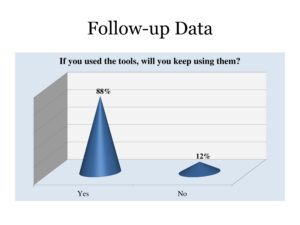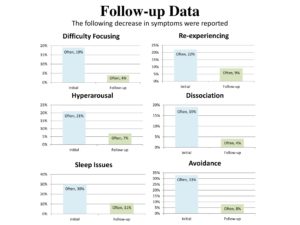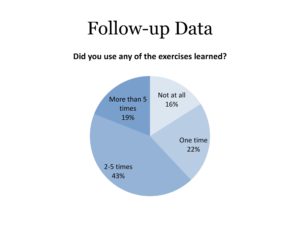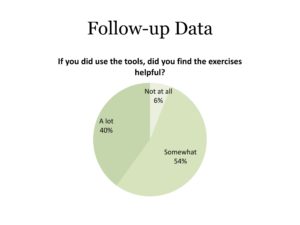Follow-up Interviews
The information below shows the data we’ve gathered through follow-up interviews for the START community pilot. The point of the follow-up is to check how the intervention tools are working and if the participant is still experiencing their trauma symptoms at the same rate they reported in the initial interview. Below is a summary.
Results
Data gathered from our follow-ups indicate that in all categories of trauma symptoms that START addresses, there has been a decrease in the rate the participants experience those same trauma symptoms (from the time of the initial interview to the time of the follow-up). Below is an overview of some of the data gathered from our community pilot:
The graph above displays the decrease in the rate that participants experience their trauma symptoms. For example - for the trauma symptom “difficulty focusing,” 19% of the participants reported experiencing that symptom “often” in the initial interview. However, for the follow-ups, only 4% of participants reported experiencing that same symptom “often.” This same type of decrease can be found in all symptoms START screens for.
The graphs below display more of out findings from the follow-ups:
 Part of the follow-up interview includes checking how the intervention tools are working for the participant. To do that, we ask them questions that pertain to the tool’s helpfulness and the participant’s overall satisfaction with the tools. As the data shows, 62% of the participants reported using the tools 2 or more times. 94% of participants reported finding the tools helpful, and 88% said they plan to keep using them.
Part of the follow-up interview includes checking how the intervention tools are working for the participant. To do that, we ask them questions that pertain to the tool’s helpfulness and the participant’s overall satisfaction with the tools. As the data shows, 62% of the participants reported using the tools 2 or more times. 94% of participants reported finding the tools helpful, and 88% said they plan to keep using them.
It should also be noted that a large number of participants report a feeling of catharsis when utilizing some of the START tools. For example, in regard to the “Common Experiences after Trauma” portion of the intervention tools, many participants reported how helpful it was for them to be able to simply sit down and talk about feelings and experiences related to their symptoms.
The data that has been shown reflects our findings for March 2015 – April 2017, for a total of 162 participants. A large portion of the individuals we interviewed were African American and Latino and in terms of the age group, the individuals in this data are between 16 to 25. In regard to gender, 64% identified as Male; 36% identified as Female. During this period, START was administered at 5 different community-based organizations.



